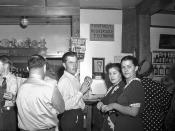Both Jane Tompkins and John Edgar Wideman devote some of their paper to pointing out the difficulties they face when writing their essays, "Indians" and "Our Time" respectively. The two authors are trying to reach and give an account of the actual situation and circumstances of the subject of their writing, but in the process of creating their essays realize that this is something they would hardly achieve.
"Our time" was created to tell the story of the author's brother Robby, who is in jail for murder, to reveal him as a person and find the reasons for his trouble. However, setting out to write about this, Wideman becomes fully aware that his brother is a "familiar stranger" to him, that he doesn't know him and has yet to learn how to communicate and share with him in order to learn and write his story. Jane Tompkins, in distinction to Wideman, already had a good knowledge about the Indians, and, as she says, "had a lot of common with them."
The difficulty for her is that when she is conducting her research, reading all different kinds of books that deal with the history and the culture of the American Indians, she cannot easily distinguish the true from the biased and the bogus because she is faced with numerous sources that are "completely incommensurable" - Miller hardly acknowledges the presence of the Indians in North America; Vaughan stereotypes them as inferior and having passive, "female" characteristics; Higham assumes that they were integrated in the American society; Jennings portrays them as inhumanely treated victims; Martin gives a highly spiritual and religious meaning even to their hunting, while Hudson explains from an economic point of view; Axtell maintains that being a captive of the Indians is a great, enlightening experience, while Heard...


